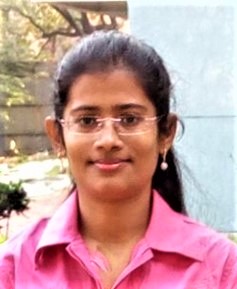Shreya Some, Scientist in the WG III Technical Support Unit (TSU), talks about the responsibilities of the TSUs, joining the WG III unit, and work in the time of COVID-19.

Shreya Some is a Scientist in the IPCC WG III TSU and is based in Kolkata, India. Her research interests include emission trend analysis, sustainability and co-benefits analysis of various adaptation and mitigation options. She has a Masters degree in Economics from Jadavpur University, 2015.
She has worked as a Contributing Author in Chapter 5 of the IPCC Special Report on Global Warming 1.5°C and World Resources Insitute Ocean Report. Prior to joining IPCC, for a short while, she has worked as a Business Analyst with Wipro Technologies (India) and was a Summer Intern at Reserve Bank of India (Kolkata).
Can you tell us a bit about yourself? What is your background and expertise?
Hi! I am Shreya Some from Kolkata, West Bengal (the artistic and cultural capital of India). I’m an economist by training. My research interests broadly include analysing the additional socio-economic and development related benefits and costs of taking climate actions (actions that help to adapt to and prevent further climate change). This benefit-cost analysis basically helps in policy prioritization for a sustainable future. I am very passionate about reducing emissions from the agricultural system and a transition, to something more sustainable, in a fair way for all, especially supporting those marginalised workers/farmers engaged in the agricultural system who must shift their ways for their better future.
What were you doing before you arrived at the WG III TSU?
I was in the last year of my Ph.D. working on the economics of emission mitigation from Indian agriculture and was about to give my pre-submission seminar (which got postponed due to Covid-19) at Jadavpur University, Kolkata, India. I was also an exchange scholar (UGC-DAAD- 2019-21) at TU Bergakademie Freiberg, Germany working on sustainability of CDM (Clean Development Mechanism) projects in India.
As I was about to submit my Ph.D. thesis, I was looking for post-doc/ research opportunities in the field of climate change. The advertisement for an IPCC TSU member looked promising and I applied for it. I was interested in IPCC work because during my Ph.D. days, I assisted Prof. Joyashree Roy (Coordinating Lead Author) on the IPCC SR 1.5 report as a Contributing Author.
For people who aren’t familiar with the IPCC, can you explain what the TSU does?
The TSU (Technical Support Unit) has a lot on its plate! It primarily provides support to the IPCC co-chairs and vice-chairs to prepare IPCC reports.
Firstly, it provides scientific support. TSU members can provide scientific research inputs as Contributing Authors or Lead Authors in different Chapters of the report. They also prepare technical papers and Supplementary Materials as and when required. I am a Contributing Author on the WG II report, Drafting author of the WG III-Summary for Policymakers and Lead Author on the WG III- Technical Summary, for the AR6 report.
Secondly, it provides technical support. The TSU does the final checks (editing, formatting and sometimes providing scientific inputs) before the Chapters go for several stages of review. It helps to support the preparation of figures/exhibits.
Finally, it provides organisational support. This is the most crucial part. Large numbers of authors are involved in preparing IPCC reports. Coordination among them is very important. The TSU helps in building coordination among authors by organising meetings (recently e-meetings!)
What is your role in the TSU Science team? What does your day to day look like?
I’m a Scientist in the WG III TSU. I joined the TSU in the latter part of the IPCC AR6 cycle, so my role is to provide final checks of the Chapters before they go for Expert and/or Government Review. I am also involved in preparing the Summary for Policymakers (SPM) and Technical Summary (TS).
Days are not always packed, so I can concentrate on my own research as well. The days before the reports go out for Government Review are somewhat packed but there is no pressure-I do my work at my own pace. Oh also, we have Monday meetings in TSU to catch up where each of us are in our task (given the pandemic- for me Mondays are happy days as I can see my colleagues’ faces—ha ha!)
What has been your favourite thing about the job so far?
The best thing about the job is that I (an early career climate researcher) am getting to learn ‘hot topics’ (relatively new to me) related to the climate by participating in so many e-meetings. Those discussions are very helpful in broadening my knowledge base.
I would also like to mention that for an early career researcher like me it is very important to work in a friendly and very efficient team- I am elated to be a part of AR6 WG III TSU- Thanks to my wonderful London and Ahmedabad Colleagues!!
What are you most looking forward to for the remainder of the AR6 cycle?
I am looking forward to meeting my colleagues physically. Since I’ve joined during the Pandemic lock-down I haven’t actually been to the TSU office in Ahmedabad in person and I haven’t even met my India-TSU colleagues. Besides these, I am looking forward to the final approval session of the report. We are really working very hard!
Do you have any new hobbies this year thanks to the pandemic?
I am suddenly extremely interested in learning about historic literature, mostly related to WW2 and world politics (maybe because I am getting to know more about climate related politics). These have become sort of my new hobbies now. I have also started playing indoor cricket with my mother (and my brother whenever he is home). I love cricket and used to play a lot when I was a kid. So, the pandemic has given me an opportunity to pursue my long lost ‘passion’.

Leave a Reply